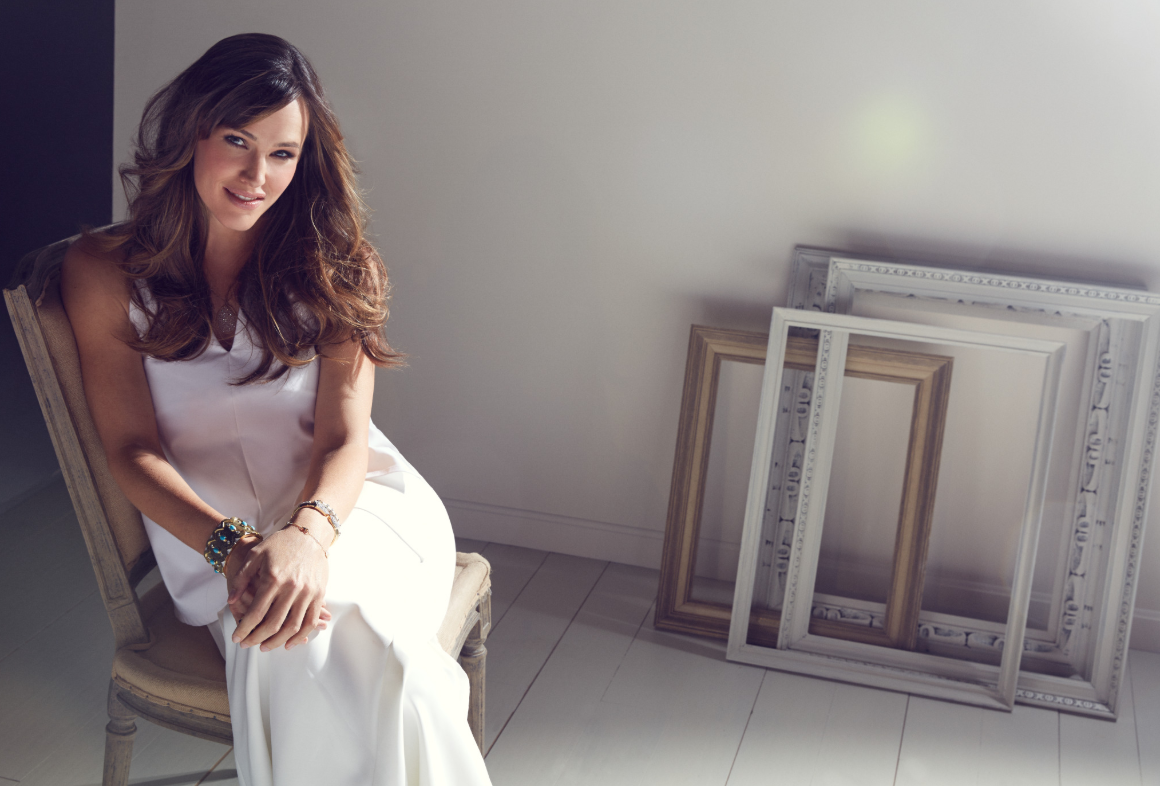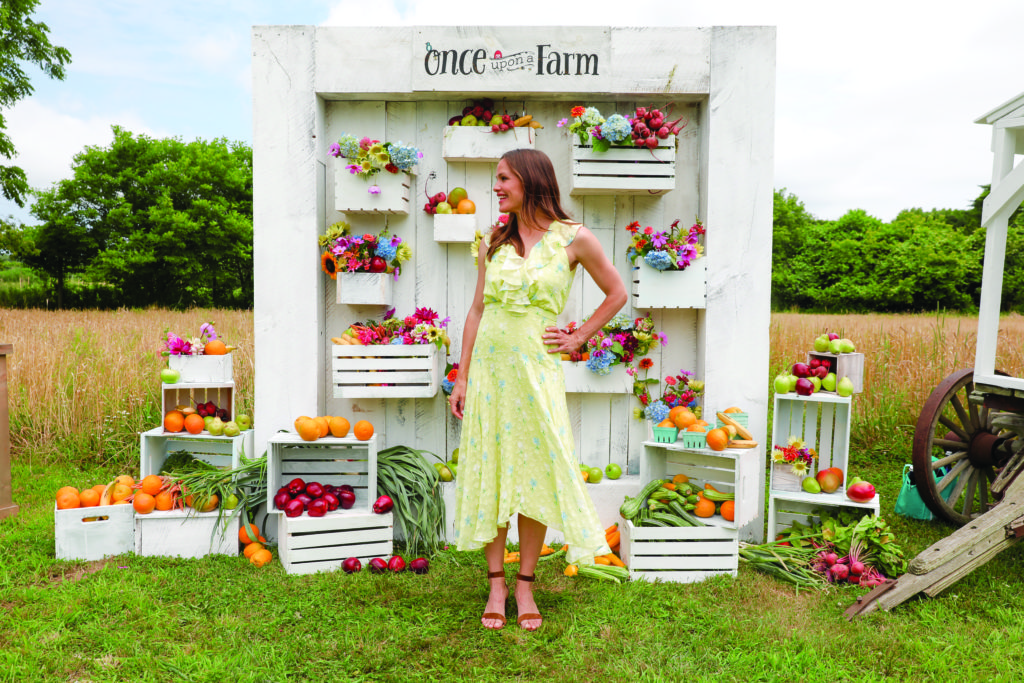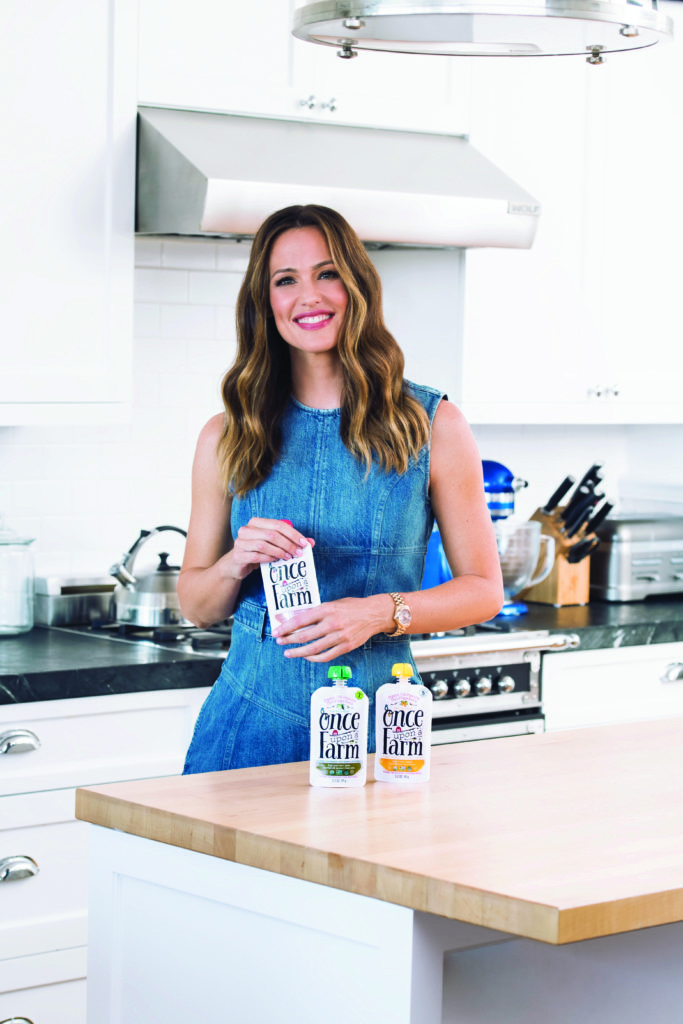
by Cristina Cuomo
Jennifer Garner is as wholesome and farm-grown as a girl next door gets. Raised in a small West Virginia town, Garner grew up the middle daughter of a chemical-engineer father and a teacher mother. She wore home-sewn clothes and only ate homemade, farm-fresh foods, so it’s no wonder she’s taken on a new business venture called Once Upon a Farm that provides that same healthy, all-natural, vitamin-rich food for babies. She’s even turned her mother’s Oklahoma farm into an organic resource for the company, where this fall, her whole family, including her three children (with Ben Affleck), will celebrate their foray into bettering our Earth.
It’s easy to say Garner uses her celebrity to further good causes that always involve children and food. She lends her time to Save the Children, and supports The Edible Schoolyard. The Golden Globe-winning actress of such TV hits as Alias, and films 13 Going On 30, Juno, Dallas Buyers Club, The Kingdom, Catch and Release, and last year’s The Tribes of Palos Verdes is also taking on her first dark comedic role as an obsessively organized and controlling wife in the upcoming HBO series, Camping. Creators Lena Dunham and Jenni Konner say Garner’s character is “messy, tough, and provocative and really, really fun,” continuing, “we love Jennifer’s restraint and comedic timing, and we can’t wait for the warmth and intelligence she’ll bring to our central character.”
On the eve of her Once Upon a Farm launch in the Hamptons, we sat down with Garner to discuss all things good for you.
CRISTINA CUOMO: Congratulations on Once Upon a Farm. It’s a brilliant concept, much-needed in the baby food space. I wish I had it when my kids were little.
JENNIFER GARNER: Me too.
CC: How was it growing up in West Virginia with a mother who made all your delicious garden-fresh food, and how did that carry over into your own household?
JG: When I was a kid, I was annoyed that mom made my clothes and my meals. I wanted store-bought clothes, and I wanted packaged, processed food more than anything in the world. But when I got older, went to college and worked in summer stock, I made my own meals, because that’s what tasted good to me, that’s what my body expected. You either are the way you’ve grown up, or you’re fighting against it pretty hard.
My kids can all bake. They can roll out dough. And much to their chagrin, their food is homemade. In my mind, my mom baked bread every Sunday, so I try to bake bread every Sunday. Mom says, “Jennifer Garner, I didn’t bake bread every Sunday—only some Sundays, when I had time.” It was so special to have that fresh-baked bread smell that I’ve always done it.
CC: What compelled you to start your own business, which helps parents give their kids the next best thing to farm-fresh food?
JG: Ari Raz and Cassandra Curtis already had Once Upon a Farm up and running when I met them. The recipes are Cassandra’s. I was thrilled to jump onboard. Having three children, and making all of their food—I did steam it, grind it, freeze it, and carry it with me—was such a pain, and I had help. It just felt crazy to feed my kids what is out there, but sometimes I was so busy that there was no other option. Why is it that we say, “That’s like baby food,” as though it’s the worst possible way to describe the texture, flavor, consistency, freshness of food on the market? It’s messed up that there are refrigerators in the dog food aisle, and that baby food is colorless, texture-free and flavorless.
CC: Tell me about converting your century-old family farm to organic farmland for Once Upon a Farm.
JG: My mom grew up on this gorgeous little family farm in Oklahoma. It had a big old summer garden, some cows and a ton of chickens. But it wasn’t properly farmed; I think it was because it was the era of the Dust Bowl during the Great Depression. There was nothing growing.
The farm came under my care, maybe a year-and-a-half ago, when I started working with Once Upon a Farm. We were talking about the importance of organic farms; I said, I have a farm. Nothing was grown on it, so it’s totally organic, with gorgeous soil. We started talking about how it would be a dream come true to bring this farm to life for my mom. The next thing you know, we’ve gone and done it. There are fields plowed, and my mom is thrilled.

CC: How do you select the vegetables, and why is cold-pressed really the best way to process this food?
JG: We use a couple of different companies who are aggregators of organic produce. The team sources the nearest, closest, freshest, organic non-GMO best fruits and veggies they can. The cold press is just a way to offer something as fresh as it can possibly be, without making it yourself. It makes perfect sense that baby food would be in the refrigerated aisle.
CC: Let’s talk about your new HBO series, Camping. What drew you to the obsessively organized and aggressively controlling Kathryn Siddell-Bauers?
JG: She is all of those things. You can see in the writing why she is the way she is, why she is controlling the way she is, why she can be shrill the way she can be, what has taken her there, and you can see the real Kathryn underneath, who her husband fell in love with, who her friends used to know. And I think that with all of us, there are parts of us that get hardened over time, and we don’t even realize that we’ve lost the fun or the ease of being younger. I love that about Kathryn.
CC: This is your first series since Alias, and now your life is full with kids and a business. How is it different now?
JG: I could never do again what I did in Alias. It was nine months a year, seven days a week; it felt like 24 hours a day. There wasn’t a moment that wasn’t focused on the show, whether it was learning lines, or learning a fight, or a language, doing press for it. It was total focus, and that is such a luxury, but that is not something that I could do anymore, certainly not with kids and a business, and [my work with] Save the Children.
Camping is only eight episodes, a half an hour each. It was a limited schedule, and an ensemble, so it’s not all on my shoulders. It’s just fun and funny, and really light and all about the words, and I wasn’t running around in high heels. I don’t think I wore high heels once the whole time we were shooting.
CC: It was such a good show, showcasing women as confident, powerful, strong—you set a great example for your kids in roles onscreen and off, especially with your work with Save the Children. What has been the most distinct way you’ve been able to share all this knowledge about health and humanity with your kids?
JG: The most effective way to teach your kids is to live. You teach them by living, and that is what I try my best to do. Every time they said anything I would say, “Say thank you, say please!” Then I realized, they are going to grow up and say please and thank you. They’re in a house where people say please and thank you. It’s really not about me being so rigid and freaked out by it; I just have to live it, and they will do it. Just like my mom baking bread. She didn’t tell me to grow up and bake bread but I learned from watching her.

CC: It’s lead by example. So, the Dalai Lama talks about happiness being intertwined with helping other people. How has your life’s evolution beyond acting, as a businesswoman, and working with Save the Children, fulfilled you?
JG: A hundred percent I agree with him, and I always tell my kids, “If you’re feeling unhappy, there are three things you can count on. There’s exercise: Just get up and get out of your groove. Community: Find the communities you believe in and commit to them, so that you can be held accountable and you can hold them accountable. That is such a healthy thing, including your family community. And then, look outside yourself, at who you can help.
I would say that working for Save the Children has been one of the great joys of my life. It’s really hard work and it’s really frustrating work, because it’s such a no-brainer to help poor kids in our own country get off to the right start at school. Helping them younger and earlier is the way to do that, and it’s frustrating that this is not considered a national health crisis. But, we can move the needle, and we can help, kid by kid, so you do what you can do.
CC: What is the best advice your mother ever gave you?
JG: Happiness is your own responsibility. Don’t look to anyone else to make you happy.
CC: What is your favorite thing to cook at home?
JG: A lot of mom food—a roast chicken, salmon, bread. We always have fresh cookies around. I love homemade ice cream. I make a lot of pizza.
CC: What is one thing you do every day to stay healthy and clearheaded?
JG: Work out, preferably with a girlfriend. Finding a dance cardio workout is just something that makes me happy, and so I do Body by Simone.
CC: What are you good at?
JG: Parsing through a problem with a girlfriend.
CC: Ooh, I like that. What are you bad at?
JG: I am bad at a lot of things. Hand-eye coordination.
CC: What are you most excited about?
JG: I am excited about my family being together at the farm this fall, and celebrating Once Upon a Farm.
CC: Being a mother, a professional, a humanitarian, a farmer, how do you manage all that?
JG: I have a great team of women around me who help me manage it. I have an amazing manager. She and I have worked together for 19 years, and she’s one of my best friends. She’s my workout buddy and my mom buddy. I have an amazing assistant, who takes the social media stuff on. My schedule is put together carefully to make sure that kid time is protected, so you know that everything gets done that needs to get done.





